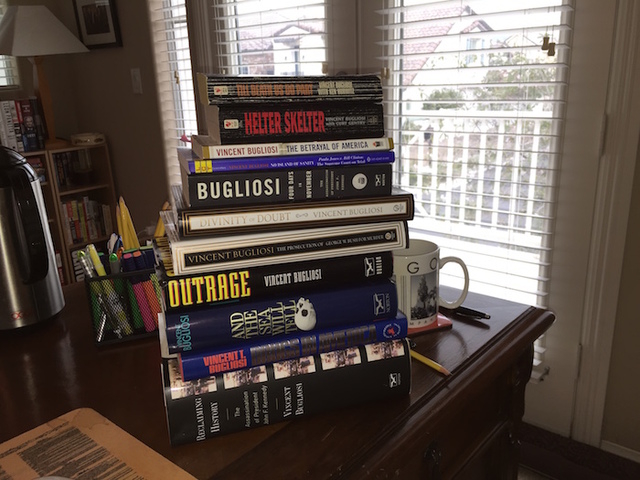Vincent Bugliosi, famed prosecutor and author, dies at 80
Vincent Bugliosi was a great lawyer for the same reason he later became a great author: He let no detail, no matter how small or seemingly unimportant, escape his notice.
Whether he was prosecuting murderers, including the notorious Manson Family in 1960s Los Angeles, or writing incisive books on subjects as varied as the O.J. Simpson trial or the virtues of agnosticism, Bugliosi’s writing betrayed an exacting, precise intellect.
And he was relentless, a lifelong workaholic whose long days produced criminal convictions, incisive interviews and bestselling books.
Bugliosi, 80, died Saturday in Los Angeles after battling cancer for the last three years. He’s survived by his wife, Gail, and two children, Wendy and Vincent Jr.
I first met Bugliosi at the Los Angeles Times Festival of Books in 2011, where he’d come on a Sunday morning to discuss his book, “The Divinity of Doubt.” In it, he argued that the inherent contradictions of the Bible made the God of modern Christianity impossible, but also that modern atheists such as Christopher Hitchens, Sam Harris and Richard Dawkins had succeeded only in proving modern religion was flawed, not that God doesn’t exist.
He wrote the book, he said, because of the “silliness” of all the literature on the God debate. “There’s nothing of substance out there,” he said at the time. And silliness was something Bugliosi did not suffer gladly.
Over the course of two, 90-minute interviews, I chatted with Bugliosi about that book, as well as his previous tome, “The Prosecution of George W. Bush for Murder,” in which he outlines a compelling case that the former president knew the premises of the Iraq War were false, and thus the deaths of U.S. service members in that country were not only unnecessary, but prosecutable crimes.
“I’m going to pursue this until I hit a brick wall,” Bugliosi told me at the time. He’d worked with constitutional law professors to identify the pitfalls in bringing an indictment against a former president, and went so far as to write to attorneys general and district attorneys to inform them about the case, and offer his assistance in preparing it. Perhaps not surprisingly, he got no takers.
The book was virtually ignored in U.S. media, but became a bestseller anyway, thanks in large part to Bugliosi’s name and reputation, and his promotion of the book in alternative media.
Bugliosi has had some of the most popular non-fiction, true-crime books in history, thrice hitting No. 1 on the New York Times bestseller list, from the classic account of the Manson prosecution (“Helter Skelter”) to an incisive criticism of the Simpson murder prosecution (“Outrage: Five Reasons Why O.J. Simpson Got Away With Murder”). An endnote in his Simpson book attempting to address a question about why God allowed a jury to free Simpson laid the groundwork for “Divinity of Doubt.”
Many of Bugliosi’s other books are must-reads for anyone interested in law and justice: He excoriated the U.S. Supreme Court in two monographs, one questioning the decision to allow the Paula Jones civil case to proceed against President Bill Clinton while he was still in office (“No Island of Sanity”) and other flaying the infamous Bush v. Gore decision that essentially handed the presidency to Bush in 2000 (“The Betrayal of America”).
His own private-sector law career provided the inspiration for other books, including “And the Sea Will Tell,” a fascinating murder mystery that unfolds on the tiny Pacific atoll of Palmyra.
But perhaps Bugliosi’s most ambitious project was “Reclaiming History,” the more-than-1,600-page examination of the murder of President John F. Kennedy. A book 20 years in the making, it’s Bugliosi’s magnum opus, in which he concludes that Lee Harvey Oswald acted alone in assassinating the president. (The book reflects the results of the only prosecution ever brought in the case, a 1986 live-action mock trial in which Bugliosi for the prosecution succeeded in “convicting” Oswald, defended in that instance by Gerry Spence.)
Bugliosi’s writing career is all the more impressive when one considers that he didn’t own a computer, wrote all his manuscripts longhand on yellow legal pads (including the 1.5 million words of “Reclaiming History”) and did all of his research in the public library.
There are far too few people, it seems to me, who are willing to challenge the status quo at risk of their own reputations. (In his letter to would-be Bush prosecutors, he quotes Mark Twain to ask “why is physical courage so common, but moral courage so very rare?”) Bugliosi was a person of great moral courage, and the silencing of his pen is a loss for everyone in America who cares about the legal system and justice. After a career of long hours, spent carefully and meticulously assembling the evidence to lead his jury of readers to their verdict, the prosecution can finally rest.






















